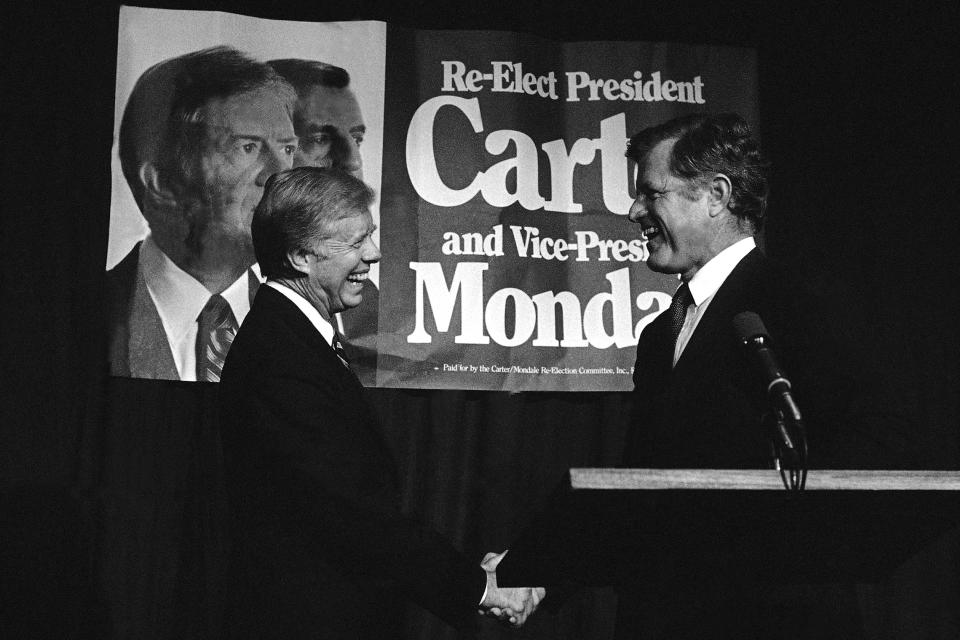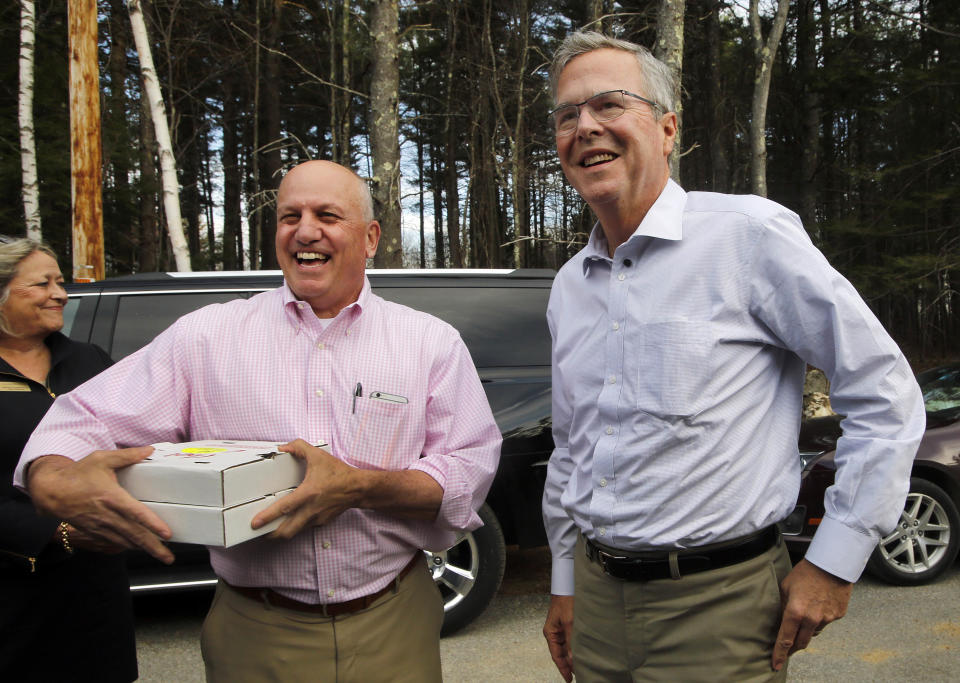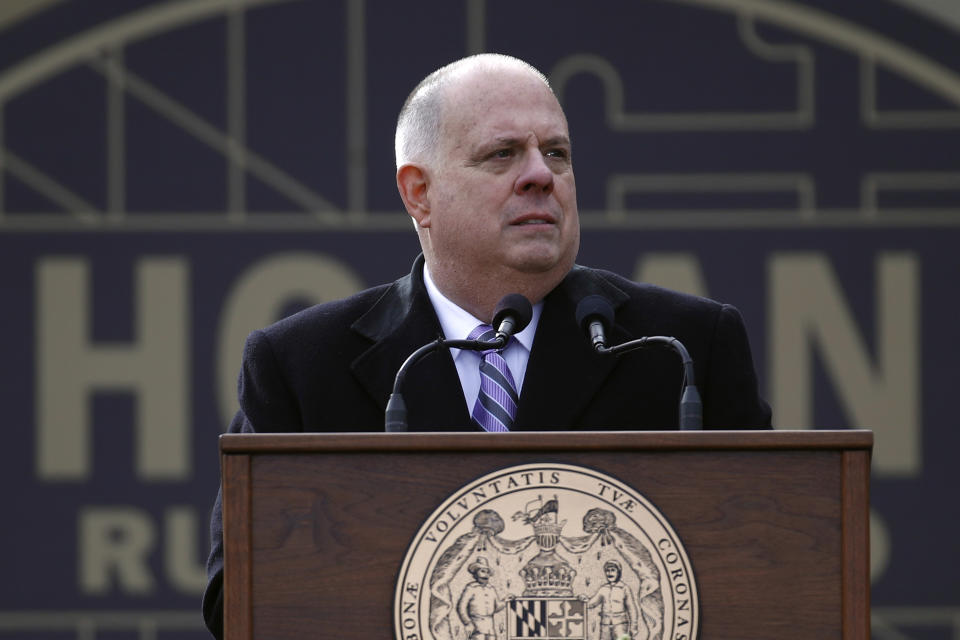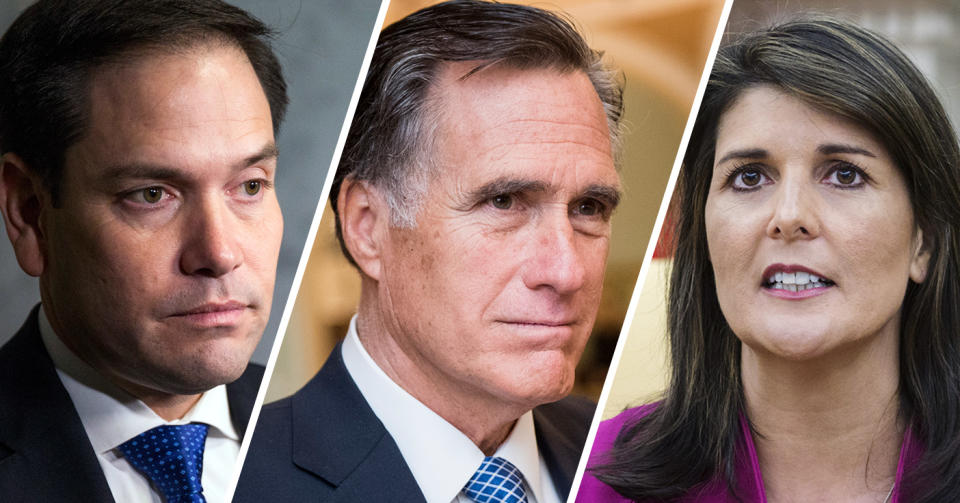Post-shutdown, some Republicans see door ‘slightly ajar’ to challenging Trump
Former Sen. Jeff Flake, R-Ariz., sat alone at the Don Pepi pizza shop inside New York’s Penn Station on Tuesday afternoon, eating a piece of deep-dish, and mused about the possibility that a candidate could beat President Trump in the upcoming Republican primary races.
It wouldn’t be him; that morning he had declared he would not run for president in 2020. But what would it take to challenge Trump in a state like New Hampshire, the first-in-the-nation primary state, which is notoriously independent-minded?
Flake mentioned that he’d given a few speeches in the Granite State, but had concluded that Trump’s hold on the Republican base — there and elsewhere — was too strong, due to the “tribal” nature of American politics.
Nonetheless, the question of whether Trump might face a viable primary challenge in 2020 has come up more frequently of late, in particular after the president was criticized by far-right supporters for agreeing to reopen the government without any money for a border wall.
“The door is now slightly ajar, but only for the right person,” commented a veteran and well-connected Republican consultant in New Hampshire, who asked not to be identified by name.
“The best person would not be perceived as anti-Trump. A large portion of the party supports Trump, and if the opponent is just a Never Trumper, that would in no fashion be enough to win.” A candidate who could effectively challenge Trump, the consultant said, would have to be “energetic, a self-funder, [with a] positive message and serious effort with a realistic plan to win.”
It’s a “very high bar,” the consultant said.

The bottom line: There is no clear alternative at the moment, and plenty of skepticism about the best-known Republican considering a primary challenge, former Ohio Gov. John Kasich, who may have hurt his chances by taking a job with CNN as a paid commentator. Dave Carney, a GOP consultant based in New Hampshire who works on national political races, told the New Hampshire Journal after Kasich joined CNN that Kasich was a “nonstarter” as a Republican primary candidate.
But the recent shutdown and the general perception that Trump bungled nearly every aspect of it has set things on a trajectory that, if it continues, could open the door a crack to a Republican alternative.
Nearly two-thirds of New Hampshire voters said in a recent New Hampshire Journal poll that the shutdown was not worth the cost to government workers, even if it had in fact resulted in government funding for a wall.
Last August, 40 percent of New Hampshire Republicans said a competitive primary in the state would be a good thing. In Iowa, where the state caucus kicks off the primary season in just a year, 63 percent of Republicans said in a Des Moines Register/CNN poll conducted in December that they would welcome a competitive primary. In both New Hampshire and Iowa, Trump’s approval with Republicans is high, and yet they are generally open to a primary challenge.

Some of that is self-interest. Iowa and New Hampshire both benefit politically and economically from their positions as the first primary states, and have a vested interest in contested primaries.
And the absence of a clear-cut alternative to Trump at the moment limits his vulnerability. In 1979, talk of a challenge to President Jimmy Carter revolved around a unanimous other choice: Sen. Ted Kennedy, D-Mass. A CBS/New York Times poll in June of 1979 showed that 52 percent of Democrats nationwide preferred Kennedy, compared to just 23 percent for Carter and 8 percent for California Gov. Jerry Brown.
Kennedy did in fact go on to challenge Carter in the 1980 Democratic primary, and nearly defeated him at the party convention.
A national poll by the Washington Post and ABC News released Tuesday showed mixed signs for Trump. He has 75 percent approval from Republicans and GOP-leaning independents, but almost one in three of those voters said they would like someone else to be the Republican nominee.
New Hampshire Republicans express a variety of opinions on how viable a primary challenge to Trump is now, and might be in the future. Some were skeptical.
“The problem is money and ideological positioning for the primary. At this point, no one can compete,” said Republican consultant Mike Dennehy.
“If you are suggesting that something may break that weakens him in the months ahead, I agree that anything is possible,” Dennehy allowed.

Steve Duprey, one of three New Hampshire representatives on the Republican National Committee, noted that the energy around the Democratic primary might make it hard for a Trump challenger to get attention in the state, since voters can cast ballots in either party’s open primary system. “A challenger would do well with independents potentially but with such a crowded Democratic field, many of those will likely vote in that primary,” Duprey said.
A second Republican consultant who didn’t want to be quoted by name agreed with this theory. “Every day that goes by with flurries of Dem activity here, and in the news, the potential primary interest versus [Trump] wanes,” he said.
But Jim Merrill, who ran Mitt Romney’s 2012 New Hampshire campaign, said that “while the president still enjoys strong support from the party base, cracks are showing.”
“With our primary still a full year away, the President’s overall level of support in the red, and the Mueller report on the horizon, a contested GOP primary here with a credible opponent is more plausible than ever,” Merrill said. “For years, our primary voters have famously demanded that candidates earn their vote — including incumbent presidents. In 2020, I expect New Hampshire voters will demand that of President Trump, with more than one Republican to choose from.”
If Kasich is not the clear choice for Republicans, it’s not clear who else might have a shot. It has been speculated that Maryland Gov. Larry Hogan, a Republican in a liberal state, might challenge Trump, but he has not made his intentions clear.

Conservative pundit Erick Erickson, who is not a fan of Trump, wrote on Monday that he had spoken with “several potential 2020 prospects” recently, and that he believes “there will be a challenge to the president in a primary.”
“The GOP leadership is more certain than ever it is going to happen. Given the conversations I have had, I think they are right to be concerned. But, as I told the people who met with me, I still think President Trump is the nominee in 2020,” Erickson wrote.
Michael Graham, political editor of the New Hampshire Journal, noted that the Iowa polling from December indicated that the best candidate to take on Trump in a primary would be someone not previously known as an opponent or critic of the president.
Iowa Republicans rejected Kasich, Flake and former Sen. Bob Corker, R-Tenn., but “were far more open to the idea of possibly supporting [Sen. Marco] Rubio (59 percent), [Sen. Mitt] Romney (53 percent) and [former Ambassador to the United Nations Nikki] Haley (49 percent),” Graham wrote.
“The ideal challenger to Trump wouldn’t be one of his mortal enemies but one of his pragmatic allies — someone who voters understood wasn’t a big fan of the president but decided to find ways to stay positive rather than preaching doom and gloom to the GOP faithful,” he said.
In other words, Republican voters might be more open to a challenge to Trump by a candidate who is seen as stepping up more in sadness than out of anger.
The challenge, Graham noted, would be maintaining such a posture, once a challenger made his or her intentions known and the intra-party conflict was out in the open.

_____
Read more from Yahoo News:



